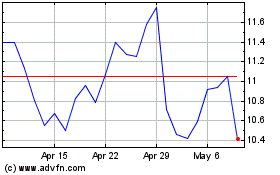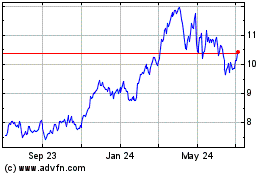WSJ: Spain Pushes Local Banking Reforms
February 16 2011 - 1:13PM
Dow Jones News
Despite complaints from Spain's ailing savings banks that reform
efforts are moving too swiftly, the Spanish government is standing
firm in its push to quickly convert the local institutions into
traditional banks, according to people familiar with the
matter.
The government's new solvency decree will firm up a set of
ambitious reforms announced by Spanish Finance Minister Elena
Salgado last month. It represents Spain's latest effort to confront
the structural problems of the euro zone's fourth-largest economy,
which has been badly damaged by the implosion of its once-mighty
real estate sector.
(This story and related background material will be available on
The Wall Street Journal website, WSJ.com.)
The new rules will likely result in the end of the savings
banks, known as cajas, whose archaic business structures are
misunderstood and mistrusted by investors. The decree will
establish a time frame for the restructuring of ailing financial
institutions in need of fresh capital, and define how much cash
they will need to raise if they want to prevent partial
nationalization.
The cajas are furiously preparing stock market listings and
sounding out private investors ahead of a government-set September
deadline, in an attempt to avoid last-resort measures, such as
capital injections from taxpayers. Senior caja executives complain
that the September deadline may imperil listings, and could
increase the number of partial nationalizations, because it would
leave just a small window to sell shares before the summer
holidays. So far, four institutions have disclosed plans for
IPOs.
The government isn't bending much in the face of such
complaints, however, according to a person familiar with the
content of the decree. The September deadline won't be moved,
however there will be some flexibility for lenders that have a
strong business plan and have their capital-raising plans far
advanced when the deadline passes.
"There simply isn't market appetite for all the cajas to go
public at once," said David Franco, a partner at Freshfields
Bruckhaus Deringer in Madrid. He sees further room for another
consolidation round before the summer, with the most solvent cajas
absorbing the weakest links.
Spain recently announced higher capital requirements for all its
banks, part of a wider effort to shore up investor confidence in
the country's financial system, particularly the cajas, whose
weakness had become a flashpoint for investors around the globe.
Spain's borrowing costs surged after Ireland was bailed out in
November, but funding pressures diminished in recent weeks as the
government focused on key pension and financial sector reforms.
Banking stocks have also surged over the past month, indicating
that investor appetite for Spanish lenders may be gradually
returning, analysts say.
In a preliminary estimate, the government said banks will need
to raise around 20 billion euros in new capital, although that is
about half the amount estimated by most private-sector
analysts.
Last year, Spain's central bank forced through a number of
shotgun mergers among the cajas, reducing the number of entities to
17 from 45. Analysts say that Spain's banking market remains quite
fragmented, with excess capacity in a system in dire need of
restructuring.
The cajas will also focus on the fine print of the new capital
requirements to calculate how much extra cash they will need to
raise. Finance Minister Salgado sent a letter to banking
associations last week indicating that the weakest unlisted lenders
will be required raise their capital cushions--the buffers banks
must keep against potential losses--above 10% of their assets.
Healthier banks will also face higher solvency requirements, a core
capital ratio of 8%, still below the buffer set for the weak
cajas.
The new regulations, set to be approved at the government's
weekly Cabinet meeting, come as investors have been sounding out
the cajas for potential bargains. Hedge fund executives, mutual
fund managers and sovereign wealth funds have flocked to Spain to
meet with senior cajas executives and look for potential deals in
Spain's battered financial system, according to people familiar
with the situation.
The race to find private capital may also open the door to
global banking giants. In an unusual invitation earlier this month,
top executives from the two biggest lenders in the country, Banco
Santander SA (STD, SAN.MC) and Banco Bilbao Vizcaya Argentaria SA
(BBVA, BBVA.MC) said they would welcome the arrival of foreign
banks to Spain because that would help "professionalize" the
sector.
Listed Spanish banks would like to see foreign banks buy up
smaller local rivals to avoid government intervention in the
sector, which they say would give state-supported banks an unfair
advantage.
The big Spanish banks are also expected to look for caja deals.
BBVA, for example, said earlier this month that it wants to boost
its market share in Spain by 50% over the next three years and that
it may end up buying some caja assets.
The Spanish government believes these reform efforts, plus its
progress in lowering its budget deficit, will shore up investor
confidence, and ensure it can raise the approximately EUR170
billion in financing it needs from markets this year.
BBVA Bilbao Vizcaya Arge... (NYSE:BBVA)
Historical Stock Chart
From Jul 2024 to Aug 2024

BBVA Bilbao Vizcaya Arge... (NYSE:BBVA)
Historical Stock Chart
From Aug 2023 to Aug 2024
